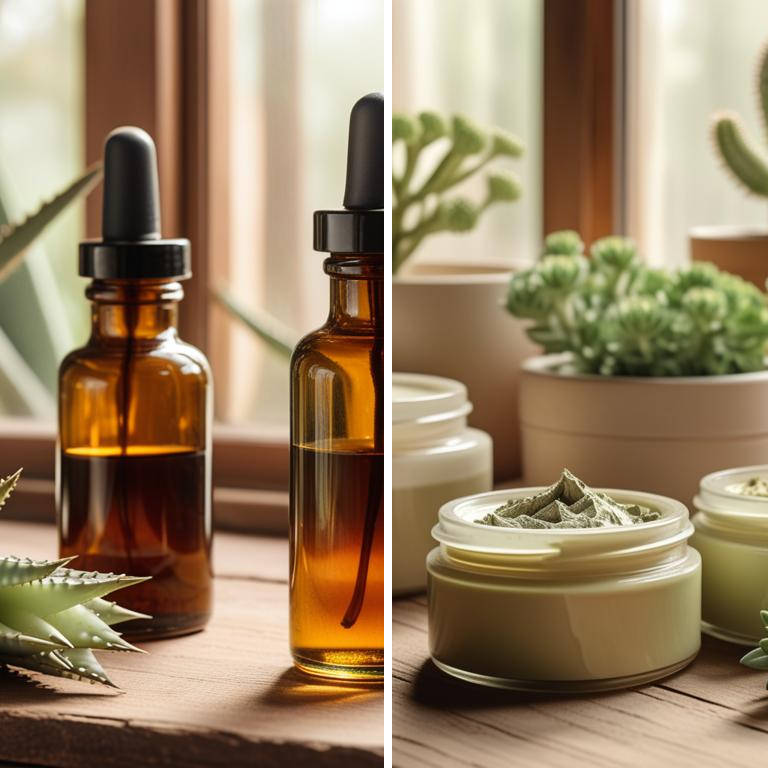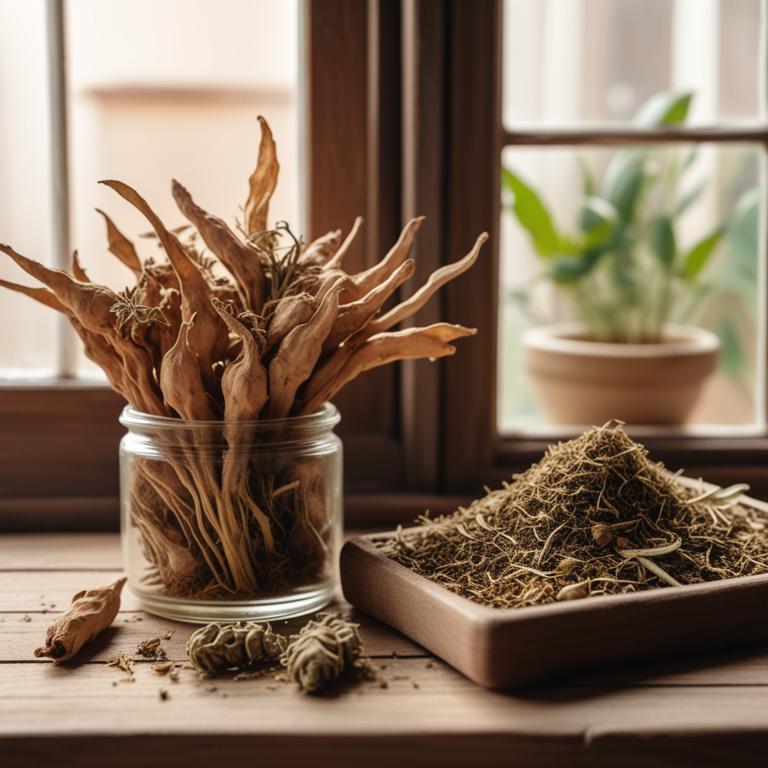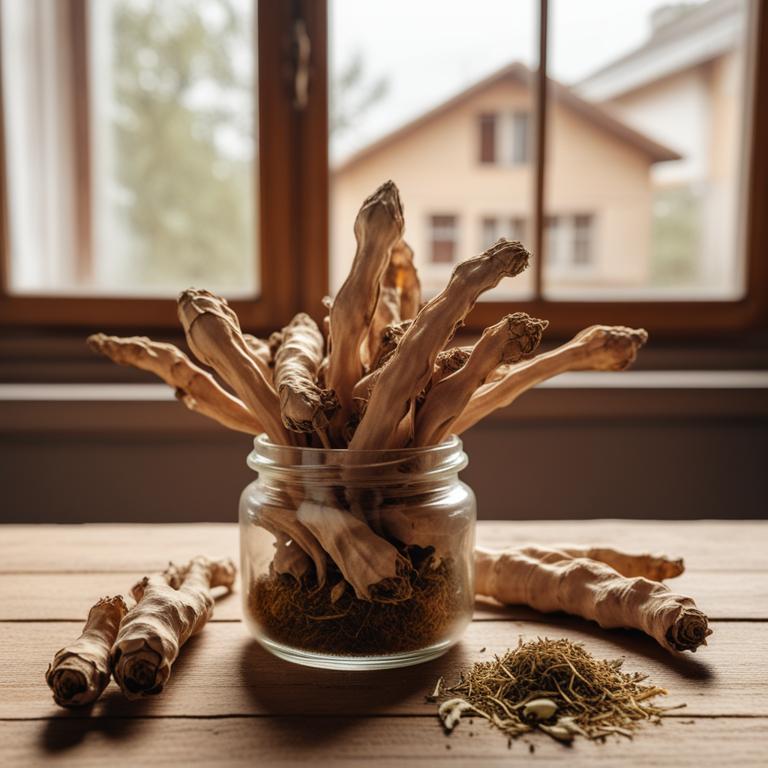Updated: Dec 1, 2024
Pink Eye Causes and Natural Treatments with Medicinal Herbs

Pink eye, also known as conjunctivitis, is a common eye infection that can be really bothersome.
When you have pink eye, your eye will turn pink or red, feel itchy and sore, and might even produce a lot of discharge or tears. It can make it hard to go about your daily activities, like watching TV or working on your computer, because your eyes will be constantly watery and uncomfortable. Pink eye is usually caused by a viral or bacterial infection that can spread through contact with someone who has the infection, or by touching something that has the virus or bacteria on it. You can also get pink eye from allergies or irritants like dust, pollen, or chemicals. There are some herbs that can help soothe and heal pink eye.
Echinacea and calendula are two of the most effective ones. Echinacea is known for its anti-inflammatory properties, which can help reduce the swelling and redness in your eye, while calendula has antibacterial properties that can help fight off the infection. To use these herbs for pink eye, you can try making a tea by steeping dried calendula flowers in hot water. Strain the tea and let it cool before applying it to a clean cloth and gently pressing it onto your closed eye. You can also try making a compress by soaking a cloth in the tea and then wringing it out and applying it to your eye.
Some people also use echinacea eye drops or ointments, but be sure to follow the instructions carefully and consult with a doctor before using any new remedies.
Table of Contents
What are the underlying causes of pink eye?
The main causes of pink eye are quite diverse, and it's essential to understand them to prevent and treat this common condition.
Viral conjunctivitis is often caused by a common cold virus, which can easily spread from person to person through touching or sharing personal items. When this virus infects the conjunctiva, the thin membrane covering the white part of the eye, it leads to inflammation and the characteristic pink or red color.
Bacterial conjunctivitis, on the other hand, is usually caused by the presence of bacteria, such as Staphylococcus aureus, which can be spread through close contact with someone who is infected, or by touching contaminated surfaces and then touching the eye. Allergies can also trigger pink eye, particularly when the conjunctiva reacts to environmental allergens like pollen, dust, or pet dander. In some cases, dust mites can exacerbate allergies and lead to pink eye symptoms.
These tiny creatures thrive in dusty environments and leave behind waste products that can be easily inhaled and trigger allergic reactions.
What are the benefits of incorporating herbs into the treatment of pink eye?
Using herbs to treat pink eye can be a great alternative to traditional medicine.
One of the main benefits is that these herbs are often natural and gentle on the eyes, reducing the risk of irritation and side effects. They can help to reduce redness, swelling, and discharge, making it easier to see and feel more comfortable. Some herbs have antimicrobial properties, which can help to fight off the underlying bacterial or viral infection causing the pink eye.
This can lead to faster healing and a reduced risk of complications. Additionally, herbal remedies can often be used in combination with other treatments, such as antibiotics or eye drops, to enhance their effectiveness. They can also be used to prevent the spread of pink eye by reducing the contagiousness of the infection.
By using herbs, you may be able to avoid the need for antibiotics or other medications, which can have negative side effects.
What are the primary medicinal herbs used to treat pink eye?

When it comes to pink eye, or conjunctivitis, herbal remedies can be a helpful addition to traditional treatment.
Calendula officinalis, also known as marigold, is a natural anti-inflammatory that can help soothe the irritated eyes and reduce swelling. Its antibacterial properties also make it effective in fighting off underlying infections that may be causing the pink eye. Echinacea purpurea, a well-known herb for its immune-boosting properties, can help the body fight off the infection more efficiently. It also has anti-inflammatory properties that can reduce the redness and discomfort associated with pink eye. Euphrasia officinalis, also known as eyebright, is a herb specifically designed to treat eye problems.
It has anti-inflammatory and antimicrobial properties that can help reduce the swelling and fight off the infection. Echinacea angustifolia, another species of echinacea, has similar properties to Echinacea purpurea. It can help boost the immune system and reduce inflammation, making it a useful addition to traditional treatment. Symphytum officinale, or comfrey, is a natural anti-inflammatory that can help soothe the irritated eyes and reduce swelling. It also has antimicrobial properties that can help fight off underlying infections. When used in combination with traditional treatment, these herbs can be a helpful way to alleviate the symptoms of pink eye and promote healing.
They can be applied topically, such as in an eye drop or a compress, or taken internally in the form of a tea or supplement.
What are the top herbal remedies for pink eye?

Herbal preparations can be a good way to help with pink eye.
A tincture is a liquid solution that can be put into the eye to help reduce inflammation and kill bacteria. It's usually made from plants like eyebright, which has been used for centuries to treat eye problems. A decoction is a strong tea made from herbs that can be put into a warm compress to help soothe and calm the eye. Plants like chamomile and calendula are often used for this purpose because they have anti-inflammatory properties. A salve or ointment can be applied directly to the eye to help reduce swelling and protect the eye from infection.
Plants like aloe vera and plantain have anti-inflammatory properties that can help soothe the eye. A cream can also be applied to the eye to help reduce inflammation and kill bacteria. Plant extracts like tea tree oil and echinacea can be used in creams to help fight off infection. An infusion is a weak tea made from herbs that can be used to make a compress or eye drops. Plants like elderflower and goldenseal have anti-inflammatory properties that can help soothe the eye.
When using herbal preparations for pink eye, it's essential to consult with a healthcare professional or a trained herbalist to ensure you're using the right herbs and preparation methods for your specific condition.
Additional Resources:
What herbs should be off-limits if you have pink eye?
If you have pink eye, it's a good idea to avoid certain herbs that can make things worse.
Aloe vera, for instance, can cause an allergic reaction that might irritate your pink eye further. This is because it contains compounds that can trigger an immune response, leading to more discomfort and redness. Ephedra, also known as ma huang, is another herb to steer clear of when you have pink eye. It's a stimulant that can increase your heart rate and blood pressure, which may exacerbate the symptoms of pink eye, such as redness and swelling. Ginkgo biloba is often used to improve blood circulation, but if you have pink eye, it's not the best choice. This herb can increase blood flow, which may spread the infection and make your pink eye worse.
Goldenseal, or Hydrastis canadensis, is another herb to limit or avoid. It contains a compound called berberine, which has antibacterial properties that can help fight off infections. However, when it comes to pink eye, it's often a self-limiting condition, meaning it will go away on its own. Using goldenseal might interfere with this natural healing process and prolong your recovery. Licorice root, or Glycyrrhiza glabra, is a common herbal remedy, but it's not suitable for pink eye. It contains a compound called glycyrrhizin, which can thin out mucus and cause it to become more sticky and difficult to clear.
This can make your pink eye symptoms worse, especially if you have a hard time getting rid of excess mucus.
FAQ
Are there any specific herbs that can prevent pink eye?
Some herbs, like eyebright and goldenseal, have been used to help prevent pink eye due to their antibacterial and anti-inflammatory properties. Eyebright is particularly known for its ability to soothe and protect the eyes, while goldenseal contains berberine, which can help fight off infections that cause pink eye.
Is it safe to use herbal remedies for pink eye during pregnancy?
It's best to avoid using herbal remedies for pink eye when pregnant.
Some herbs can be too strong and may not be safe for the baby. If you have pink eye, try using a warm compress on your closed eyes to help soothe the area.
This can help your eyes feel better, but it's not a cure.
Are there any herbs that can reduce the frequency of pink eye?
Elderberry and calendula are herbs sometimes used to help soothe and reduce the frequency of pink eye.
They're thought to have anti-inflammatory properties, which may ease symptoms.
Some people use eye drops or ointments made from these herbs as a preventative measure, but it's not a proven solution and results may vary.
Can i combine different herbal remedies for pink eye?
You can combine different herbal remedies for pink eye, but be careful.
Some herbs may interact or have side effects. For example, if you're using eye drops with chamomile to soothe the eye, you might also try applying a warm compress with calendula to help calm the area.
Just remember to patch test any new ingredients first.
Related Articles

Inflamed Gums: A Guide to Causes, Medicinal Herbs, and Remedies

Allergies: Exploring Causes and Natural Remedies with Medicinal Herbs

Tonsillitis: Causes, Herbal Remedies, and Homeopathic Preparations

The Role of Medicinal Herbs in Preventing Infection

Enlarged Spleen and Herbal Medicine: Understanding the Connections






